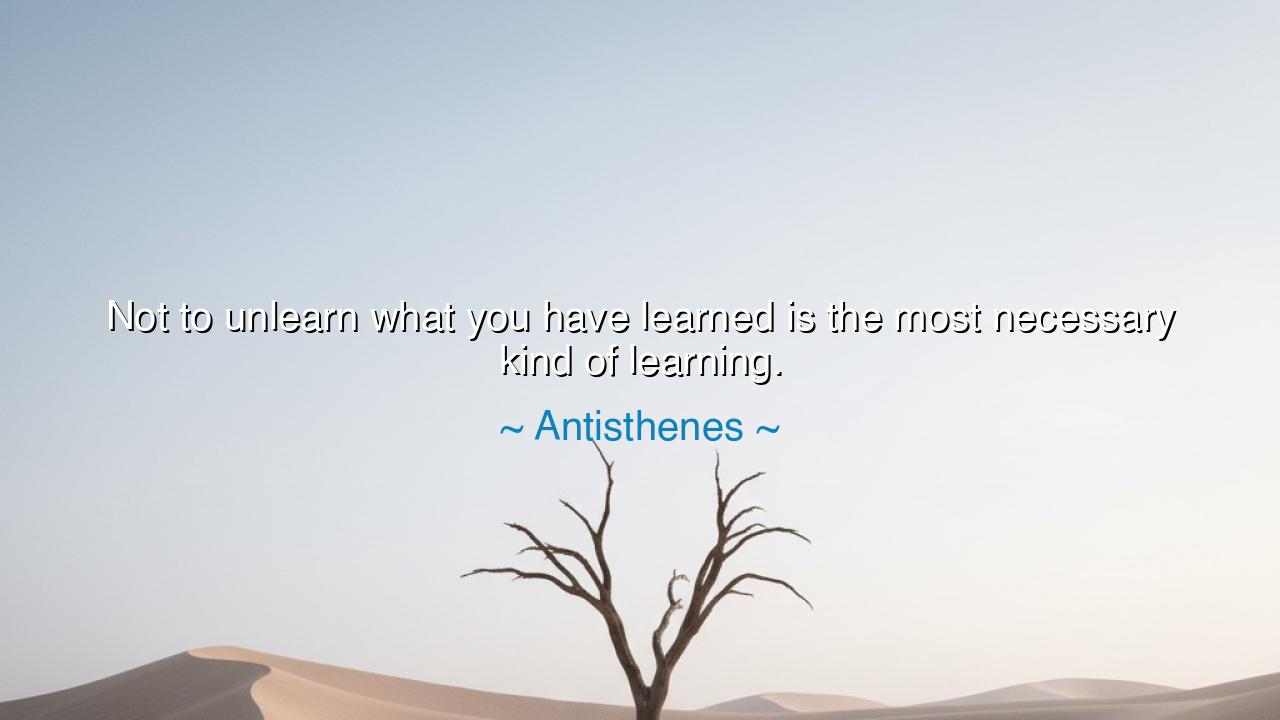
Not to unlearn what you have learned is the most necessary kind






“Not to unlearn what you have learned is the most necessary kind of learning,” said Antisthenes, the disciple of Socrates and the father of the Cynic philosophers — a man who sought truth not in comfort, but in clarity. His words are ancient, yet they pierce the heart of every age. For they speak to a truth often forgotten: that wisdom is not merely the gaining of knowledge, but the guarding of it. The one who truly learns does not discard truth for convenience, nor abandon understanding when it ceases to flatter the ego. To not unlearn what you have learned is to remain steadfast — to hold fast to the light, even when the shadows of doubt or desire try to draw you back into ignorance.
In the time of Antisthenes, Athens was a city intoxicated with cleverness. Philosophers argued for argument’s sake; poets delighted in twisting words into riddles; the pursuit of wisdom often became a performance. But Antisthenes, who had sat at the feet of Socrates, saw that the danger was not in ignorance alone — it was in forgetting what one already knows to be true. To know what is good, and yet act otherwise; to see what is right, and yet turn away — this, he said, was the greatest failure of all. For truth once learned must be lived, not merely remembered. The soul that forgets its lessons is like a vessel that leaks; it fills for a moment, but is soon empty again.
When Antisthenes spoke of the “most necessary kind of learning,” he meant not the accumulation of new doctrines, but the discipline of constancy — the training of the mind to remain faithful to what is known. Many can learn; few can hold on to what they have learned. Knowledge is light, but the world is filled with winds that seek to extinguish it: pride, fear, vanity, and pleasure. The wise must guard against these winds as a priest guards the sacred flame. This is why Antisthenes lived simply, clothed in rags, despising luxury — not because he hated beauty, but because he knew that attachment to comfort makes the mind forget what it knows about virtue.
The story of Galileo Galilei centuries later shows the same struggle. When he looked through his telescope and saw that the heavens moved not as men had long believed, he had learned a truth too bright to be ignored. Yet the world around him — the scholars, the priests, the powerful — demanded that he unlearn it, to silence his vision and return to the darkness of accepted lies. Galileo’s torment was not that he was wrong, but that he was asked to deny what he had learned. His courage to hold to truth, even when threatened, made him not only a man of science, but a disciple of Antisthenes’s wisdom.
To unlearn is not always wrong — for sometimes we must cast away falsehoods mistaken for truth. But Antisthenes spoke not of such unlearning. He spoke of the folly of abandoning wisdom once it has been truly grasped — of betraying the lessons of experience, the insights of suffering, the clarity gained through hardship. How often do we, like children, learn the same lesson again and again because we refuse to keep it? We know that anger destroys, yet we return to it. We know that honesty frees, yet we choose deceit. We know that patience brings peace, yet we rush into turmoil. To forget the lessons of life is to chain ourselves to endless repetition.
Therefore, the philosopher’s command is both stern and liberating: Do not unlearn what you have learned. Guard your understanding as a treasure hard-won. When the world tempts you to compromise what you know is right, stand firm. When your own desires whisper that the lesson is too difficult to keep, remember the cost of forgetting. The mind must be trained not only to seek truth, but to remain loyal to it once found. For knowledge without constancy is like a sword without a hand — sharp, yet useless.
So, my listener, take this teaching to heart. Do not chase endlessly after new wisdom while neglecting the old truths that have already changed your life. Reflect on what you have learned — from your teachers, from your triumphs, from your wounds — and live by it. Let experience become understanding, and understanding become virtue. The world will always offer you reasons to forget, but the soul that remembers its hard-won wisdom will walk in strength and peace. For as Antisthenes teaches, the highest form of learning is not to know more, but to remain true to what you already know is right — today, tomorrow, and for all the days to come.






AAdministratorAdministrator
Welcome, honored guests. Please leave a comment, we will respond soon